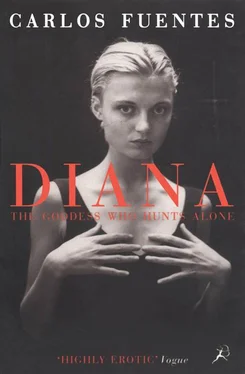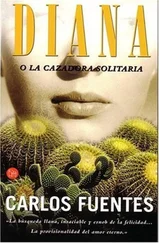Carlos Fuentes - Diana the Goddess Who Hunts Alone
Здесь есть возможность читать онлайн «Carlos Fuentes - Diana the Goddess Who Hunts Alone» весь текст электронной книги совершенно бесплатно (целиком полную версию без сокращений). В некоторых случаях можно слушать аудио, скачать через торрент в формате fb2 и присутствует краткое содержание. Год выпуска: 2012, Издательство: Bloomsbury UK, Жанр: Современная проза, на английском языке. Описание произведения, (предисловие) а так же отзывы посетителей доступны на портале библиотеки ЛибКат.
- Название:Diana the Goddess Who Hunts Alone
- Автор:
- Издательство:Bloomsbury UK
- Жанр:
- Год:2012
- ISBN:нет данных
- Рейтинг книги:3 / 5. Голосов: 1
-
Избранное:Добавить в избранное
- Отзывы:
-
Ваша оценка:
- 60
- 1
- 2
- 3
- 4
- 5
Diana the Goddess Who Hunts Alone: краткое содержание, описание и аннотация
Предлагаем к чтению аннотацию, описание, краткое содержание или предисловие (зависит от того, что написал сам автор книги «Diana the Goddess Who Hunts Alone»). Если вы не нашли необходимую информацию о книге — напишите в комментариях, мы постараемся отыскать её.
Diana the Goddess Who Hunts Alone — читать онлайн бесплатно полную книгу (весь текст) целиком
Ниже представлен текст книги, разбитый по страницам. Система сохранения места последней прочитанной страницы, позволяет с удобством читать онлайн бесплатно книгу «Diana the Goddess Who Hunts Alone», без необходимости каждый раз заново искать на чём Вы остановились. Поставьте закладку, и сможете в любой момент перейти на страницу, на которой закончили чтение.
Интервал:
Закладка:
“They think we’re all peons and that we’re still in the age of Don Porfirio,” he said. “They don’t realize things have changed.”
“Despite 1968?” I asked.
“That’s the serious part. They just keep going on as if nothing happened. Our parents are peasants, workers, business people, and thanks to their labor we go to the university and learn things. We tell our parents we have more rights than they think. A peasant can organize a cooperative and tell the mill owner to grind up his mama …”
“Who’s probably a grind herself,” I said, without getting even a smile out of the student.
He went on, and I knew I could never expect humor from him. “… or the truck owners, who are the worst exploiters. They decide if they’ll carry the harvest to market, when, and for how much, and no discounts. The crops rot. A worker has the right to form associations and doesn’t have to be under the thumb of the thugs from the CTM.”
“That’s what you tell the people who work here?”
He said he did. “Someone’s got to inform them. Someone’s got to make them aware of things. Maybe you yourself, now that you’re here …”
“I’m writing a book. Besides, I don’t want to compromise my North American friends. They’re working and can’t get involved in politics. It would be a real pain if they did. I’m their guest. I have to respect them.”
“Okay. Maybe another time.”
I shook hands with him and asked him not to take offense. We could get together sometime for coffee. He smiled. His teeth were terrible. And yet he was tall, graceful, with languid eyes, and a sagging Zapata mustache — thin, like his unfinished, patchy, almost pubic beard.
“My name is Carlos Ortiz.”
“Well, well, we’re namesakes.”
That he liked. He thanked me for saying it and even smiled.
At night, Diana and I went on building our passion. I didn’t dare ask her anything about her past loves, and she didn’t ask me about mine. I’d ventured two ideas: the company of death and the natural tendency of couples to form triangles. In reality, what both of us wanted at that stage was to feel ourselves unique, without precedents, one of a kind. The first nights were a matter of words and acts, acts and words, sometimes the one first, other times the other, rarely both at once, because the words of sex are unrepeatable, infantile, often filthy, with no interest or excitement except for the lovers themselves.
On the other hand, the words before or after the act always tended, during those early days in Santiago, to proclaim the joy and singularity of what was happening to us. With Diana Soren in my arms, I came to feel that I had written nothing before I met her. Love meant starting over. She fed and strengthened that idea: she actually told me that we were getting to know each other at the creation, before the past, before Iowa and the little skirt and the moon — she actually said that. Ultimately, she transmuted everything (and I thanked her for it) into a fantastic vision of joy as simultaneity. Sometimes during orgasm she would shout, “Why doesn’t everything happen at the same time?” It wasn’t a question; it was a desire. A fervent desire in which I joined. Welded to her flesh and her words. Yes, please, let everything happen at the same time …
We were unique. Everything began with us. Then literature butted in. I remembered Proust: “To know Gilberte again, as in the time of the creation, as if the past did not yet exist.” And from there it was only a step to the Lucho Gatica bolero that sometimes floated through the window from the servants’ rooms: “Don’t ask me anything more, / let me imagine / that the past doesn’t exist / and that we were born/at the very moment when we met…”
It’s true she hadn’t read the sentence in a novel by her husband, Ivan Gravet, where he says, more or less, that a couple exists while it can invent itself or because shit’s better than solitude. A couple’s problems begin when the two of them stop inventing themselves.
I preferred to think I was captured inside the body of this woman like a fetus that grows and fears, when it’s thrown into the world, that it loses its nourishing mother, Diana, Artemis, Cybele, Astarte, first goddess …
“I love your cloudy brow,” Diana would say when I thought these things.
“But you always have a clear brow.”
“Ah,” she exclaimed, “if one day you see me suffer, you’ll pay for it.”
IX
No sooner did I move into Diana’s house than I claimed, like some sixteenth-century Spanish explorer, a territory of my own. There I arranged my portable typewriter, my paper, and my books. Diana looked at me with smiling surprise.
“Won’t you be coming to the set with me?”
“You know I can’t. I write from eight in the morning until one — it’s the way I work.”
“I want to show you off on the set. I want to be seen with you.”
“I’m sorry. We’ll see each other every afternoon, when the day’s shooting is done.”
“My men always accompany me on the set,” she said, accentuating the smile.
“I can’t, Diana. Our whole relationship would fall apart in twenty-four hours. I love you at night. Let me write during the day. If you don’t, we’ll never get along. I swear.”
The truth is, I was going through a creative crisis whose full dimensions I had yet to measure. My first novels had been successful because a new readership in Mexico identified itself (or, rather, misidentified itself) in them, saying we are or we aren’t like that but, either way, giving an engaged, occasionally impassioned response to three or four of my books, which were seen as a bridge between a convulsed, dejected, rural, self-enclosed country and a new urban society that was open but perhaps too apathetic, too comfortable and thoughtless. One phantom of Mexican reality was disappearing, only so another could take its place. Which was better? What were we sacrificing in either case? “I’ll always be grateful to you,” said a woman who worked with me in the Foreign Office when I had published my first novel but still needed a bureaucratic salary, “for having mentioned the street where I live. I’d never seen it in print before in a novel. Thank you!”
The truth is, the social dimension of those books would have no real value for me unless it went along with a formal renovation of the novel as a literary form. The way I said things was as important as, or even more important than, what I was saying. But every writer has a primary relationship with the themes that arise from the world around him, and a much more complex relationship with the forms he invents, inherits, copies, or parodies — every novel contains those elements, feeds on those sources. The novel as a genre and impurity as an idea are sisters; the concept of the novel and the concept of originality are like a pair of mothers-in-law. I did not want to repeat the success of my first novels. Perhaps I made a mistake seeking out my new partnership exclusively in the idea of form and divorcing myself from subject matter. The fact is that one day I reached the palpable point of exhaustion between vital content and literary expression.
Living for several years in Paris, London, and Venice, I searched for the new alliance in my own vocation. I found it, just maybe and just fleetingly, in a funeral chant to the modernity that was wearing all of us out, Europeans and New World Americans alike. We were going to suffer a change of skin, like it or not. The upheavals all over the world in the 1960s did not help me; they only made it obvious that youth was elsewhere, not in a Mexican author who in the crucial year 1968 had turned forty.
Читать дальшеИнтервал:
Закладка:
Похожие книги на «Diana the Goddess Who Hunts Alone»
Представляем Вашему вниманию похожие книги на «Diana the Goddess Who Hunts Alone» списком для выбора. Мы отобрали схожую по названию и смыслу литературу в надежде предоставить читателям больше вариантов отыскать новые, интересные, ещё непрочитанные произведения.
Обсуждение, отзывы о книге «Diana the Goddess Who Hunts Alone» и просто собственные мнения читателей. Оставьте ваши комментарии, напишите, что Вы думаете о произведении, его смысле или главных героях. Укажите что конкретно понравилось, а что нет, и почему Вы так считаете.












